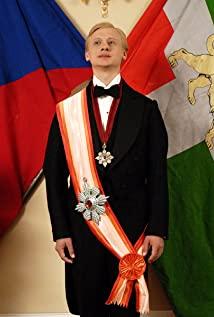Czech filmmaker Jirí Menzel's fruitful output of adapting his eminent compatriotic author Bohumil Hrabal's novels clocks in a sixth time with I SERVED THE KING OF ENGLAND, idiosyncrically chronicling the story of a man called Jan Dítě (Barney, whose impish, clownish impression that masks most of inner reading, a task taken by the laborious voiceover), notable for his blond hair and short stature (a comic interlude involving the Emperor of Ethiopia finds advantage in shortness).
However, Dítě is first introduced as an elderly man (Kaiser, composedly anchoring the comparably less exuberant part of the narrative in his finely preserved reservation and gentleness), whose blond pelt is long gone, released from a reform institution after a near 15-year sentence, and is sent to inhabit a deserted house near the border of Germany, from there, Dítě reminisces his past story, from the interwar days as a railway vendor but aiming high to be a millionaire, his subsequent waiter career spans from a local eatery , to the posh Hotel Tichota, catering to top brass and dignitary, then to the famous Hotel Paris in the center of Prague, under the tutelage the maître d' Skřivánek (Huba).
It is during that stint, coincides with the annexation of Czechoslovakia by the Third Reich, he meets his future wife Liza (Jentsch, a standout of the cast with a brainwashed gal's unwavering fascination to a deranged cause), a German schoolteacher and avid Hitler worshipper , after proving to her his Aryan credentials, Dítě successfully woos her and his action goes against the grain of Czech people's collective enmity towards Germany at then (because of which he is dismissed from his post), but undeterred, they marry and when WWII rages on, unexpected fortunes fall upon his hands and his millionaire dream actually comes true, although it is not without grievous cost.
As for the old Dítě, his hermetic existence is gingered up by the presence of Marcela (Fialová), a loose girl who tantalizes his dormant potency, which never consummates, in fact, for all its visual effusion and fairytale-like treatment of a turbulent time, Menzel's film overtly panders to the lowest common denominator with its carnal excesses (not to be obfuscated with Nazi party's lampooned eugenic delusion, which emerges as one of the most potent points made by the movie), esthetically arranged with flowers or lavish comestibles covering luscious female bodies, on top of the canny maneuver of mirrors, a motif might be fairly accused of unabashed male gaze, but Menzel does know how to present it scrumptious, on the eye level.
Avarice is another topos almost flogged to death by the actualizing of Dítě's umpteen coins-littering experiments, all result in an unrelieved reaction, but that matter is ultimately complicated by the ironic cause of Dítě's internment, from one extreme to another, Menzel is cunning enough to bestride both ends of the political spectrum in this uncharacteristic recount of an apolitical cipher, involuntarily caught up by the torrents of his politicized times.
referential entries: Menzel's CLOSELY WATCHED TRAINS (1966, 7.9/10); Taika Waititi's JOJO RABBIT (2019, 7.9/10);
View more about Obsluhoval jsem anglického krále reviews











